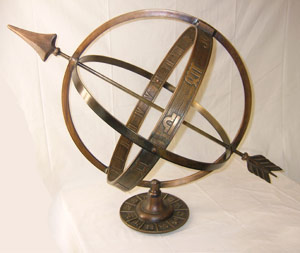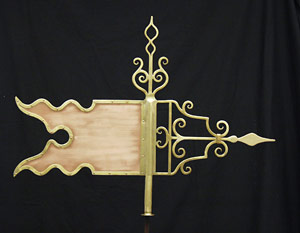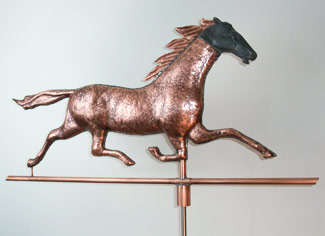Kenneth Lynch & Sons: A Legacy of Beautiful And Functional Outdoor Ornaments
 Copper sundial.
Copper sundial.Photograph courtesy of Kenneth Lynch & Sons
Since ancient times, weathervanes have been used to show direction of the wind and to predict oncoming weather. The Mesopotamians mentioned them in their writings over 3500 years ago and archeological digs have unearthed their traces across the Greek and Roman world, as well as Syria and other countries. Even the Vikings made them in the shape of birds, animals, nautical themes and Norse deities. But the earliest ones were often made of wood and unable to withstand the test of time. When the first colonists arrived to the America, they covered the wooden molds with cast iron and copper sheets to create a more durable version, changing the craft of weathervanes forever.
Soon, copper weathervanes could be found on churches and public buildings as well as on tops of homes. One of the best known copper weathervane was commissioned by George Washington and is located on the cupola at Mount Vernon. It is shaped like a dove with olive branches in its mouth and the copper is now covered in gold leaf. Thomas Jefferson attached a weathervane in Monticello to a pointer in the ceiling of the room below so he could read the direction of the wind inside his home. Patriotic themes joined the variety of these decorations.
Kenneth Lynch, founder of Kenneth Lynch & Sons, was one of the first companies in the US to produce high quality weathervanes on a massive scale. He collaborated with famous metalworkers such as Samuel Yellin and sculptors like Paul Manship, then employed several master mold makers and apprentices to create an inventory of molds as ornaments for private gardens. The first mail order catalog appeared in 1950. He continued to guide the work with various designers, architects and sculptors until his health declined. He died in 1989 and his son, Timothy, took over. Once Timothy's daughter, Maria, and her husband, Derrick Dumoulin, joined the company, an industrial parcel of land was located in Oxford, CT, and a 36,300 sq. ft. building was completed in January of 2007. Timothy has since retired and today Maria Lynch Dumoulin is the owner/operator of the company. Over the decades, the business grew, and today, Kenneth Lynch & Sons is one of the country's largest producers of copper weathervanes, sundials, and other outdoor sculptures.
 Copper weathervane.
Copper weathervane.Photograph courtesy of Kenneth Lynch & Sons
"Our building contains a foundry, metal shop and many molds from my grandfather," says Dumoulin. "Some weathervanes had cast aluminum or bronze elements. These parts are cast in a Connecticut foundry. My husband is an accomplished metal craftsman and hammers the copper into cast iron or cast aluminum molds. All our weathervanes and sundials are made to order in the US. Customized pieces involve our draftsmen working with the client or from a sketch, then we produce the mold. Once approved, the foundry does the casting but we assemble, patina and finish the work. Full bodied figures are brazed together with copper wire. The lightweight nature of copper is perfect for the weathervanes and we use both copper and bronze for our garden decor because of their longevity. Copper can be provided with a patina or left to age naturally.
Dumoulin added that they buy all of their copper sheets and brass/bronze ingots from Atlas Metal Sales in Denver, CO.
"Some of our custom weathervanes include a 4' tall Ferrari horse, a 35" seahorse and a 5' long tiger," she says. "The stripes on the tiger are done in relief as freehand hammering, then patinated. The piece was ordered by a private estate and the tiger is also their business logo. A hand hammered copper rooster, 40" long was placed on a renovated building in Middlebury, now housing The Shops at Whittemore Crossing, CT. We also make copper banners, which have the option for customization with a logo or business dates. An ever-popular figure weathervane is the Ethan Allen horse, unique in that it has a lead head that allows accurate dispersing of weight for even spinning. Both weathervanes and banners need provisions during construction because they penetrate the roof below them to support the shaft in a vertically plumb position. They come with hold down or locking devices so wind can never blow them away. Our creations are not merely decorations, but are fully functional."
 Ethan Allen horse copper weathervane.
Ethan Allen horse copper weathervane.Photograph courtesy of Kenneth Lynch & Sons
Long before clocks, people used sundials (also referred to as shadow clocks and solar clocks) as important timepieces and astrological devices in their gardens. Some were horizontal and told time, others were flat brass templates on pedestals. Many were shaped like globes. They hung on garden walls to accompany the overall designs and were often placed in central outside locations so they could be easily seen by anyone walking by. Because the concern today is mostly aesthetic, Kenneth Lynch & Sons consider the details more important than ever.
"Since we want our sundials to be as precise as possible, we make sure the gnomon is assembled with the correct degree of latitude where it is going to be placed," she says. "Daylight savings time is also taken into consideration. Our sundials are made from bronze or iron and last a very long time. Bronze is available in two patinas, Statuary Bronze which is a brown finish with highlights of bronze and Verde Patina which is an antique green. Both are expertly applied. Elements on bronze sundials can also be gilded. We strive to furnish accurate sundials as well as provide beautiful garden ornaments."
Kenneth Lynch & Sons does not do exhibitions or give demonstrations. According to Dumoulin, they are just too busy working and keeping up with demand.
"We acquired Florentine Craftsmen in 2011 and they specialized in furniture and statuary work," says Dumoulin. "Their line is now manufactured by us. Our main focus now is to continue my grandfather's legacy of producing unsurpassed craftsmanship."
Resources:
Also in this Issue:
- Kenneth Lynch & Sons: A Legacy of Beautiful And Functional Outdoor Ornaments
- The Quaint and Awe-Stirring Lure of Cottage Gate Creations
- Bird Feeders Redefined as High Art
- Ruth Asawa Exhibition at Christie’s
- Roy Datz: Designer of Unique Handmade Copper Doors And More
